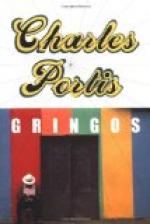Foolishly they agreed that it was.
CHAPTER XIV
RODEO TIME
In those days of large leisure and cyclonic bursts of excitement and activity; of midday siestas and moonlight serenades—and a duel, perchance, at sunrise—the spring rodeo was one of the year’s events, to be looked forward to all winter by the vaqueros; and when it was over, to be talked of afterwards for months. A mark from which to measure the passing of time, it was; a date for the fixing of incidents in the memory of men.
In the valley of Santa Clara, rodeo time really began when the Picardo vaqueros cinched saddles upon restive mustangs some misty morning, and with shouts and laughter and sombreros waving high over black heads in adieu to those who remained behind, swept down the slope like a charge of gayly caparisoned cavalry, driving the loose saddle horses before them. Past the stone and adobe wall of the home pasture, past the fences where the rails were held to their posts with rawhide thongs, which the coyotes sometimes chewed to pulp and so made extra work for the peons, they raced, exultant with life. Slim young Spaniards they were, clothed picturesquely in velvet and braid and gay sashes; with cumbersome, hairy chaparejos, high-crowned sombreros and big-roweled, silver spurs to mark their calling; caballeros to flutter the heart of a languorous-eyed senorita, and to tingle the pulse of the man who could command and see them ride gallantly to do his bidding.
Fairly in the midst of them, quite as gaudy to look upon and every whit as reckless in their horsemanship, rode Dade and Jack. If their hearts were not as light, their faces gave no sign; and their tongues flung back the good-humored jibes of their fellows in Spanish as fluent as any they heard.
When they left the highway and rode straight down the valley through the mustard that swept the chests of their plunging horses with dainty yellow and green, the two fell behind and slowing their horses to an easy lope, separated themselves from their exuberant fellows.
“I wish you were going along,” Dade observed tritely. “If Jose Pacheco changes his mind and stays at home, I’ll send you word and you can come on, if you want to.”
“Thanks.” Jack’s tone, however, did not sound thankful. “If I wanted to go, do you think I’d hang back because he’s going?”
“No, I don’t. I think the prospect of a fine, large row would be a temptation; and I must say I’m kinda surprised that you’ve been able to resist it. Still, I realize there’s compensations.”
“Sure, there are. I never denied it, did I?”
“Never. I reckon you’ve sent by Bill Wilson for a trumpet to proclaim—”
“Oh, shut up. I think,” Jack decided suddenly and without any visible cause, “I’ll turn off here and ride around by Jerry Simpson’s. Adios, old man, and heaps of good luck to you.” He swung abruptly off to the right and galloped away, looking back over his shoulder when he had ridden a hundred paces, to wave his sombrero and shout a last word or two of farewell.




